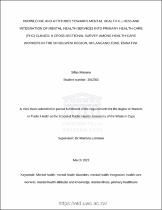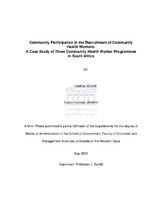| dc.contributor.advisor | Lembani, Martina | |
| dc.contributor.author | Manana, Sifiso | |
| dc.date.accessioned | 2023-05-11T07:20:19Z | |
| dc.date.available | 2023-05-11T07:20:19Z | |
| dc.date.issued | 2022 | |
| dc.identifier.uri | http://hdl.handle.net/11394/9914 | |
| dc.description | Master of Public Health - MPH | en_US |
| dc.description.abstract | It is estimated that one in eight people globally suffers from mental health conditions during their lifespan. In Sub-Saharan Africa (SSA), mental health disorder sufferers are exposed to abuse and economic impoverishment. In Eswatini, mental health care is still not decentralized to primary health clinics (level 1), only health centers (level 2) and hospitals (level 3) offer mental health services daily. This causes a treatment gap. The study aimed to determine the knowledge and attitudes of primary health care workers towards mental health illness and their willingness to provide mental health services in primary healthcare clinics so that opportunities and challenges surrounding the integration of mental healthcare services can be identified in the Shiselweni region, Nhlangano zone, Eswatini. | en_US |
| dc.language.iso | en | en_US |
| dc.publisher | University of the Western Cape | en_US |
| dc.subject | Mental health | en_US |
| dc.subject | Mental disorder | en_US |
| dc.subject | Public health | en_US |
| dc.subject | Eswatini | en_US |
| dc.subject | Psychiatric | en_US |
| dc.title | Knowledge and attitudes towards mental health illness and integration of mental health services into primary health care (phc) clinics: A cross-sectional survey among health-care workers in the Shiselweni region, Nhlangano zone, Eswatini | en_US |
| dc.rights.holder | University of the Western Cape | en_US |




